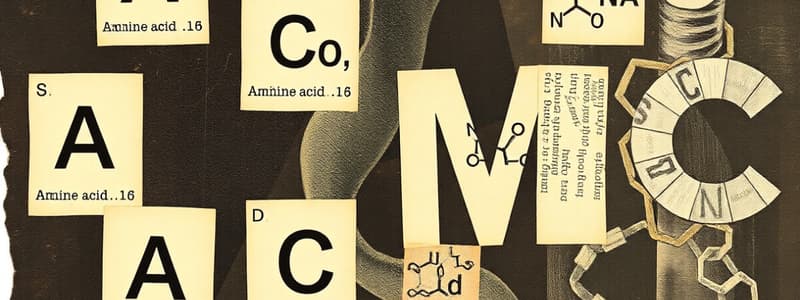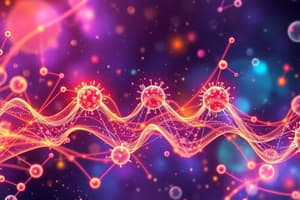Podcast
Questions and Answers
Which type of amino acids are characterized as nonpolar?
Which type of amino acids are characterized as nonpolar?
- Aromatic amino acids
- Nonpolar amino acids (correct)
- Basic amino acids
- Neutral amino acids
Tyrosine is classified as a basic amino acid.
Tyrosine is classified as a basic amino acid.
False (B)
Name one amino acid that crystallizes as an uncharged molecule at neutral pH.
Name one amino acid that crystallizes as an uncharged molecule at neutral pH.
Phenylalanine
The amino acid _____ is known for having a hydroxyl group.
The amino acid _____ is known for having a hydroxyl group.
Match the amino acids with their classifications:
Match the amino acids with their classifications:
Which of the following amino acids is considered an aromatic amino acid?
Which of the following amino acids is considered an aromatic amino acid?
Ornithine is classified as a neutral amino acid.
Ornithine is classified as a neutral amino acid.
Which amino acid is represented by the symbol 'Ala'?
Which amino acid is represented by the symbol 'Ala'?
What is the one-letter abbreviation for glutamine and glutamate together?
What is the one-letter abbreviation for glutamine and glutamate together?
Histidine is considered essential for adults.
Histidine is considered essential for adults.
What are the three main components that define an amino acid?
What are the three main components that define an amino acid?
The combination of amino acids and __________ is crucial for protein synthesis.
The combination of amino acids and __________ is crucial for protein synthesis.
Match the amino acid classifications with their correct definitions:
Match the amino acid classifications with their correct definitions:
Which amino acid is coded for conditions when there is a lack of precursors?
Which amino acid is coded for conditions when there is a lack of precursors?
There are only 20 amino acids incorporated directly into mammalian proteins.
There are only 20 amino acids incorporated directly into mammalian proteins.
What does mRNA stand for?
What does mRNA stand for?
The classification table for amino acids is presented in __________.
The classification table for amino acids is presented in __________.
What does Asx represent?
What does Asx represent?
What is one of the purposes of amino acid degradation?
What is one of the purposes of amino acid degradation?
Amino acid degradation only produces urea as a waste product.
Amino acid degradation only produces urea as a waste product.
Which cycle is involved in the oxidation of carbon skeletons from amino acids?
Which cycle is involved in the oxidation of carbon skeletons from amino acids?
The carbon skeletons from amino acids may enter the Krebs cycle via ______ as acetyl-CoA.
The carbon skeletons from amino acids may enter the Krebs cycle via ______ as acetyl-CoA.
Which of the following is NOT a product of complete amino acid degradation?
Which of the following is NOT a product of complete amino acid degradation?
Amino acids can be synthesized from their degradation pathways.
Amino acids can be synthesized from their degradation pathways.
What is released during the complete oxidation of amino acids?
What is released during the complete oxidation of amino acids?
Amino acid degradation produces energy similar to that of ______.
Amino acid degradation produces energy similar to that of ______.
Match the following compounds with their roles in amino acid metabolism:
Match the following compounds with their roles in amino acid metabolism:
The degradation of amino acids primarily serves to produce which of the following compounds?
The degradation of amino acids primarily serves to produce which of the following compounds?
Which of the following statements accurately describes purines?
Which of the following statements accurately describes purines?
Pyrimidines include adenine and guanine.
Pyrimidines include adenine and guanine.
What two amino acids are incorporated in the synthesis of purines?
What two amino acids are incorporated in the synthesis of purines?
The primary nitrogen sources for purine synthesis are two molecules of __________ and one molecule of __________.
The primary nitrogen sources for purine synthesis are two molecules of __________ and one molecule of __________.
Match the following components of nucleotide synthesis with their roles:
Match the following components of nucleotide synthesis with their roles:
What compound is formed when homocysteine condenses with serine?
What compound is formed when homocysteine condenses with serine?
Cysteine can be directly converted from homocysteine.
Cysteine can be directly converted from homocysteine.
What amino acid is particularly important in the synthesis of collagen?
What amino acid is particularly important in the synthesis of collagen?
Methionine is metabolized to __________ and ketobutyrate.
Methionine is metabolized to __________ and ketobutyrate.
Match the amino acids with their metabolic pathways:
Match the amino acids with their metabolic pathways:
What is the primary pathway for glycine degradation?
What is the primary pathway for glycine degradation?
Glutamate does not provide material for the synthesis of ornithine and proline.
Glutamate does not provide material for the synthesis of ornithine and proline.
What does the cysteine carbon skeleton primarily come from?
What does the cysteine carbon skeleton primarily come from?
The prominent pathway for glycine in rat liver transfers a methylene group to __________.
The prominent pathway for glycine in rat liver transfers a methylene group to __________.
Which of the following amino acids supplies more than adequate amino-N to glutamate?
Which of the following amino acids supplies more than adequate amino-N to glutamate?
Flashcards are hidden until you start studying
Study Notes
Amino Acid Classification
- Amino acids are categorized based on their properties at neutral pH, including polarity and charge.
- Nonpolar amino acids crystallize as uncharged molecules.
- Neutral amino acids are neither acidic nor basic.
- Aromatic amino acids contain a benzene ring structure.
- Basic amino acids have a positive charge at neutral pH.
- The classification of amino acids is crucial for understanding their roles in protein structure and function.
Essential Amino Acids
- Certain amino acids are considered essential because the body cannot synthesize them.
- These must be obtained through the diet.
Dispensable Amino Acids
- The body can synthesize these amino acids from other molecules.
- However, under specific conditions, some dispensable amino acids can become conditionally indispensable.
Amino Acid Degradation
- Degradation serves to generate energy through oxidation and produce other nitrogen-containing compounds.
- The ultimate products of amino acid oxidation are CO2, water, and urea.
- The carbon skeletons of amino acids can be used to synthesize other molecules like fat and carbohydrate.
- The degradation pathway of one amino acid can often be the synthetic pathway for another.
Amino Acid Metabolism
- Glutamate plays a crucial role in amino acid metabolism, acting as a buffer pool for nitrogen and contributing to the synthesis of ornithine and proline.
Purine and Pyrimidine Synthesis
- These are the building blocks of DNA and RNA.
- Purine synthesis requires multiple amino acids, including glutamine, glycine, and aspartate.
- Pyrimidine biosynthesis involves glutamine and aspartate.
Creatine Synthesis
- Glycine contributes to the creation of guanidinoacetic acid, which is then methylated by S-adenosyl methionine to form creatine.
Cysteine Synthesis
- Methionine is metabolized to homocysteine, which then condenses with serine to form cystathionine.
- Cystathionine breaks down to yield cysteine, NH3, and ketobutyrate.
- Cysteine's carbon skeleton originates from serine.
- Although methionine is degraded to NH3, this pathway is the primary synthesis route for cysteine.
Studying That Suits You
Use AI to generate personalized quizzes and flashcards to suit your learning preferences.




